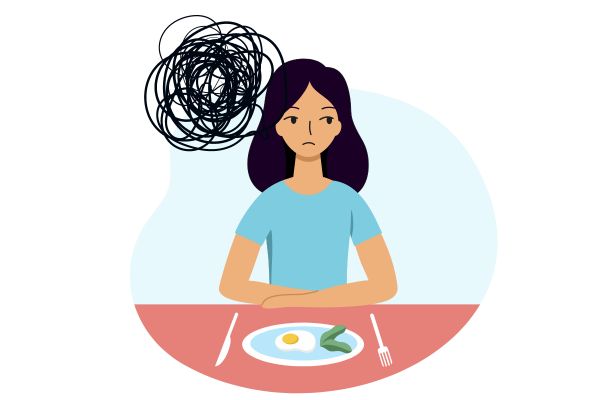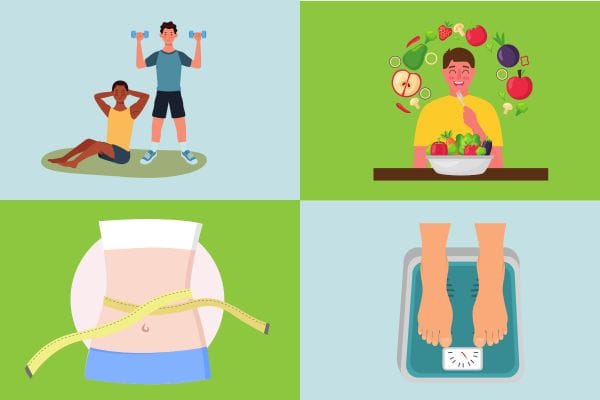“I won’t let a number on a scale own me.”
This short statement encapsulates the constant battle that millions of people face in their relationship with food and their bodies. This battle, known by the term “Eating Disorders”, is marked by the profound disruption in eating patterns accompanied with distressing thoughts and emotions. Before discussing the complexities of Eating Disorders, I would like to say this issue demands our attention now, more than ever, with a society that places importance on appearances and body image.
What are Eating Disorders?
So what exactly are Eating Disorders? They are behavioural conditions that affect eating habits which most often develop in adolescence and young adulthood. However, these disorders can affect those of any ages, genders, ethnicities or body types.
There are several types of eating disorders characterised by specific symptoms. Some of the most common ones include anorexia nervosa, bulimia nervosa, binge eating disorder, avoidant restrictive food intake disorders (ARFID) and other specified feeding and eating disorder (OSFED).
Anorexia Nervosa – Individuals fear gaining weight or becoming fat thus engage in restrictive eating, excessive exercise, intermittent binge eating and/or purging by vomiting or laxative misuse.
Bulimia Nervosa – Is characterised by a pattern of alternating between restrictive eating and binge eating. Binge eating involves consuming large amounts of food in a short period of time, accompanied by a loss of control. It is followed by “compensatory behaviours” such as fasting, vomiting, laxative misuse or excessive exercise due to feelings of guilt and embarrassment.
Binge eating disorders – Involves binge eating episodes with consumption of large amounts of food in a short period of time, and a sense of loss of control. Unlike bulimia nervosa, it is not followed by “compensatory behaviours” of vomiting, fasting, laxative misuse or excessive exercise.
ARFID – Avoidant Restrictive Food Intake Disorders can be characterised by disturbances in eating, leading to ongoing challenges in meeting nutritional requirements and involves extreme picky eating.
OSFED – Other Specified Feeding and Eating Disorder is a diagnostic category that includes eating disorders or disturbances causing distress and affecting daily life, but they don’t fully fit into specific, well-defined eating disorder criteria.
What are Some Causes of Eating Disorders?
Eating disorders can occur from a combination of genetic vulnerability and environmental triggers. Some of the causes of eating disorders include:
– Societal factors such as the pressure to diet and negative comments about body image. This is a very common cause and is also seen amongst famous celebrities such as Taylor Swift who admitted that seeing a negative comment about her appearance would “trigger (her) to just starve a little bit – just stop eating.”
– Feel the need to control weight and shape.
– Specific genes that are associated thus increase the risk of eating disorders.
– Other mental health issues such as trauma, depression, anxiety, obsessive-compulsive disorder (OCD).
– Losing initial weight can make further dieting compelling and rewarding.
– Emotional disturbances in one’s life such as loss of a loved one, end of a relationship.
What are Some Common Warning Signs of an Eating Disorder?
- Excessive “fat”, “weight” or “calorie” talk
- Excessive exercise
- Avoiding social eating settings
- Inducing vomiting or abusing laxative, diuretic and diet pills
- Reduced concentration
- Moodiness and irritability
- Low self-esteem, feelings of guilt
- Fear of negative consequences from eating such as gastrointestinal conditions
These are some common warning signs that indicate the presence of an eating disorder. If you notice someone displaying several of these signs, it is recommended to seek professional help to address the situation. However, it is important to note that these signs may not always indicate an eating disorder.
What Can You Do if You or a Loved One is Suffering from an Eating Disorder?
- Reach out to trusted people.
- Make an appointment with a mental health provider in your country.
- If you are in Singapore, here are some places to reach out:
Samaritans of Singapore – their 24-hour hotline 1800-2214444
Institute of Mental Health – their 24-hour hotline 63892000
Treatment for Eating Disorder
Treatment for Eating Disorders typically requires a collective and supportive approach as with any mental health conditions. Begin by reaching out to a local mental health professional, a registered dietitian, or trusted individuals such as family, partners or friends.
When expressing concerns with someone, ensure to be empathetic and understanding. It is important to take note that this may be challenging as the individual may feel hesitant about seeking treatment.
– Psychological therapy
a. Cognitive behavioural therapy
– Focuses on behaviours, thoughts and feelings related to the eating disorder.
– Aims to identify distorted thoughts and establish healthy eating behaviours.
– Helps recognise and change behavioural patterns related to the disorders.
– Particularly effective for adolescents.
– Involves family members in helping the individual restore healthy eating patterns.
c. Group cognitive behavioural therapy
– Conducted in a group setting with a mental health professional.
– Teaches skills to manage symptoms and regain healthy eating patterns.
– Medications for eating disorders
– As directed by a mental health professional if it is required.
– Seeking out to a registered dietitian
– Professionals help in understanding and managing eating disorders by devising a plan for healthy eating habits. Also teaches how nutrition impacts the body and addresses health problems.
– Hospitalisation may be necessary for severe physical and/or mental health issues
In Conclusion
– Eating disorders can be faced by anyone, not limited to any particular group of people.
– There are different types of eating disorders.
– Environmental and genetic factors can influence eating disorders.
– Eating disorders can be associated with those with other mental health issues.
– There are treatment options available which can help overcome eating disorders and to maintain healthy eating habits.
References
https://www.psychiatry.org/news-room/apa-blogs/eating-disorders-weight-shaming-and-clean-eating
https://www.psychiatry.org/patients-families/eating-disorders
https://psychcentral.com/eating-disorders/celebrities-with-eating-disorders
https://www.healthyplace.com/insight/quotes/quotes-on-eating-disorders
https://toledocenter.com/adolescents/7-hidden-signs-of-eating-disorders/
https://kidshelpline.com.au/teens/issues/eating-disorders
https://blog.cdphp.com/healthy-living/virtual-therapy-is-it-right-for-your-child/
https://www.counselling-directory.org.uk/memberarticles/7-hidden-benefits-of-talking-therapy












